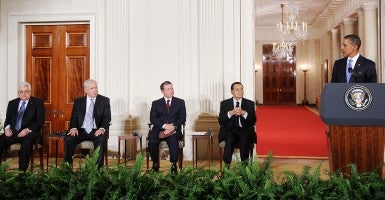The past weeks have brought an avalanche of disasters for the United States in the wider Middle East. Unless the Obama administration changes course, the coming months will bring worse.
The administration’s premise is that radical Islamist groups such as al-Qaeda and ISIS pose a greater threat to the United States than Iran. As the White House sees it, Iran is not the problem: it is a potential solution to the regional turmoil.
That’s why, after taking office, President Barack Obama offered Iran a “hand of friendship.” It’s why the United States has offered only token aid to the rebels seeking to overthrow Syria’s Bashar Assad, a client of Iran. And it’s why the administration hints it wants to work with Iran to stop ISIS’ advance in Iraq.
No doubt, al-Qaeda and ISIS are our enemies, and dangerous enemies at that. But that does not make Iran a friend. Nations are more threatening than terrorist groups, because they have more resources. And Iran is not only the world’s foremost state sponsor of terrorism. It is not just run by religious extremists. It has a nuclear weapons program. ISIS does not.
When you expand your view, the administration’s policy makes even less sense. In Syria and Iraq, ISIS is our enemy. In Nigeria, Boko Haram, the Islamist rebels who specialize in kidnapping, have caught the White House’s eye.
But in Egypt, we condemned the overthrow of a regime led by the Muslim Brotherhood. The White House has looked the other way as the terrorist group Hamas formed a so-called Palestinian unity government. And in Libya, we bombed Muammar Gaddafi out of power, only to turn our backs on the Islamists rebels and the hopelessly weak government that replaced him.
If the administration believes radical Islamists are our most dangerous enemy, it should act that way. That would be a clear policy. But it can’t stick to anything. In May, Obama ridiculously claimed that the “tide of war is receding.” When he really means by pinning his hopes on Iran is that his own interest in getting involved is receding.
The disasters of the spring should stagger us. As the Middle East was exploding, the State Department wasted its time on that most irrelevant of silver bullets, an Israel-Palestinian peace deal. Predictably, the administration failed, only to see Hamas take power.
Everything the White House has touched it has broken. The Libyan intervention replaced a terrible dictator with Islamist-tinged chaos. Egypt smolders under a repressive autocrat, while everyone blames the United States. In Syria, Bashar Assad’s regime is within an ace of victory, and we have done nothing but issue fatuous redlines and — as Obama did again on Thursday — promise the rebels aid that never quite arrives.
We’ve treated our friends even more shabbily. The administration has tried hard to alienate Israel, invested much in Turkey for no return, and now sees Jordan trembling on the brink. In Pakistan, the Taliban is bold enough to attack the Karachi airport, and in Afghanistan its position can only improve as U.S. forces depart at the end of the year.
And then there is Iraq’s collapse. The rights or wrongs of the Iraq War are irrelevant: if you’re elected president of the United States, you have to deal with the world as it is. In 2011, Obama declared that the United States. had created a “sovereign, stable and self-reliant Iraq.” That was not true then, and it is not true today.
Humiliatingly, Obama’s answer to all this is that we have to work with the Iranians. That’s the wrong answer to the wrong question. Iran is not the answer: it is part of the problem. And the question is not how we can offload the defense of our interests onto others. It’s whether we can pull ourselves off the mat before our position in the Middle East drains into the sand.






























